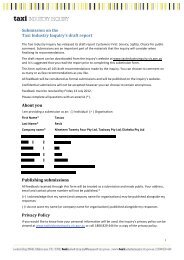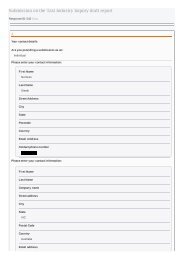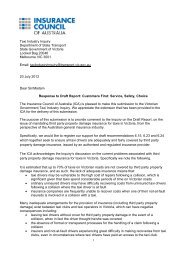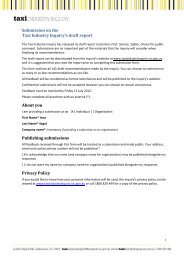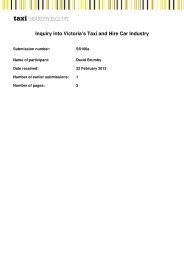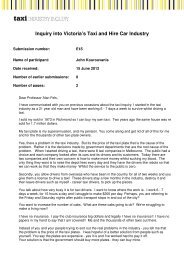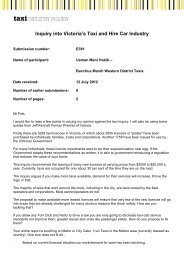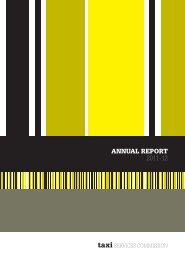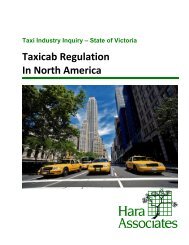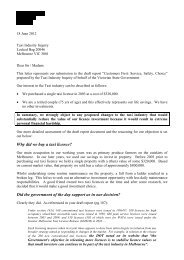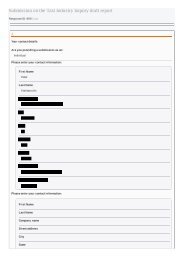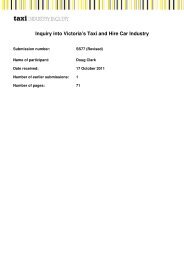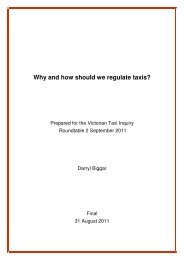Part D â Understanding and improving industry performance (PDF ...
Part D â Understanding and improving industry performance (PDF ...
Part D â Understanding and improving industry performance (PDF ...
You also want an ePaper? Increase the reach of your titles
YUMPU automatically turns print PDFs into web optimized ePapers that Google loves.
The Reserve Bank of Australia’s review of<br />
the No-Surcharge St<strong>and</strong>ards<br />
The RBA’s Payment Systems Board is responsible<br />
for promoting the safety, efficiency <strong>and</strong><br />
competitiveness of the payments system in Australia.<br />
In 2011, the RBA’s Payment Systems Board<br />
conducted a review of card surcharging due to<br />
concern about merchants exploiting payment<br />
processing fees as a source of revenue. The Board<br />
highlighted that excessive ad valorem surcharges<br />
were common in the taxi <strong>industry</strong>, as well as for online<br />
transactions or in circumstances where consumers feel<br />
they have few alternatives to using a scheme card. The<br />
Board also noted that the merchants who impose high<br />
surcharges tend to be those with market power.<br />
Surcharges in excess of the cost of card acceptance<br />
<strong>and</strong> the blending of surcharges for different cards<br />
reduces the efficiency of the payment system by<br />
removing price signals to consumers about the<br />
relative cost of different payment methods.<br />
As a result of the review, the Board has indicated<br />
that it intends to relax the st<strong>and</strong>ards to allow<br />
schemes (Visa <strong>and</strong> Mastercard credit <strong>and</strong> Visa debit)<br />
to limit surcharges. More specifically, the Board has<br />
stated that:<br />
In light of the views expressed in consultation <strong>and</strong><br />
developments in surcharging practices in recent<br />
years, the Payments System Board considers that<br />
there is a case for varying the St<strong>and</strong>ards, by<br />
allowing the schemes to limit surcharges to a<br />
reasonable cost of acceptance, while at the same<br />
time ensuring the schemes’ rules cannot prevent<br />
full cost recovery by merchants. 30<br />
The Board specifically makes it clear in its<br />
consultation document that pressure from<br />
consumers <strong>and</strong> ‘moral suasion’ alone will not be<br />
enough to change the surcharging behaviour of<br />
merchants, particularly those with some market<br />
power. The Board believes that some merchants<br />
may “require an element of compulsion to bring<br />
surcharges into line with card acceptance costs”. 31<br />
12.5.3. Regulating the service fee<br />
While there is potential for national reforms to bring<br />
change in the future, the inquiry remains concerned<br />
about the 10 per cent surcharge currently imposed<br />
on Victorian taxi users. The fact that half of these fees<br />
overall are funnelled back to drivers, NSPs <strong>and</strong> operators<br />
strongly suggests that the 10 per cent is unnecessarily<br />
high <strong>and</strong> that there will be significant consumer benefit in<br />
lowering the charge to a level where these payments are<br />
minimal or eliminated.<br />
The inquiry is also concerned that addressing some of<br />
barriers to entry into payments processing will not be<br />
sufficient, of itself, to lower the surcharge. The weak<br />
competition between taxi operators <strong>and</strong> networks<br />
indicates that competition between processors is likely<br />
to be much fiercer to attract networks, operators <strong>and</strong><br />
drivers to use processing equipment (by offering higher<br />
rebates), rather than lowering prices to consumers.<br />
While Cabcharge provided no defence of the 10 per<br />
cent surcharge to the inquiry, the inquiry did receive<br />
representations from some other payments processors<br />
arguing that reducing the allowable service fee would<br />
cause damage to competition.<br />
CabFare told the inquiry that without access to the<br />
processing of Cabcharge br<strong>and</strong>ed cards <strong>and</strong> the MPTP,<br />
the rebate to operators <strong>and</strong> drivers is the principle<br />
competitive proposition of the third party players. Not<br />
only will a reduction in the surcharge do little to improve<br />
their market position, but CabFare argues that:<br />
Varying the service fee without access by third parties<br />
to the Cabcharge cards will result in the exit from the<br />
market of Third <strong>Part</strong>y EFTPOS providers <strong>and</strong> at a low<br />
level could result in the exit of Cabcharge <strong>and</strong> the<br />
return to a cash only transaction. 32<br />
This view was echoed by other market participants<br />
who told the inquiry that competing payment processor<br />
providers would not be able to grow market share if such<br />
rebates are not offered. 33<br />
While the inquiry acknowledges that third party<br />
EFTPOS providers rely on the surcharge to compete<br />
with Cabcharge, ultimately the inquiry finds that these<br />
competitive practices do nothing to benefit consumers.<br />
3031<br />
30 Reserve Bank of Australia (RBA) (December 2011), A Variation to the<br />
Surcharging St<strong>and</strong>ards: A Consultation Document, RBA Sydney, p.1<br />
31 Ibid., p.11<br />
32 CabFare, Presentation to Taxi Industry Inquiry, 21 February 2012<br />
33 Ambassador Taxis, Taxilink <strong>and</strong> Cabways, Submission to the Taxi<br />
Industry Inquiry, SS233, p.36<br />
262



